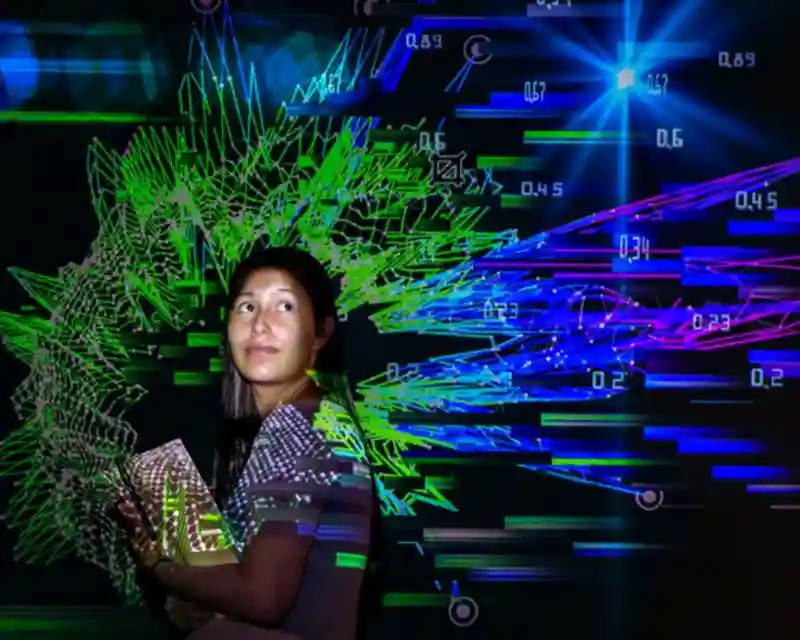
Study Artificial Intelligence in the USA

Want to be matched with Artificial Intelligence programs?
Let us know what you're looking for so we can find the best school for you.
What is the study of Artificial Intelligence?
The study of Artificial Intelligence (AI) is a multidisciplinary field that focuses on creating intelligent machines capable of performing tasks that typically require human intelligence. AI seeks to develop algorithms, models, and systems that can mimic human cognitive functions, such as learning, reasoning, problem-solving, perception, and language understanding.
The primary goals of AI research include:
- Machine Learning: This area of AI focuses on designing algorithms that enable machines to learn from data without explicit programming. Supervised learning, unsupervised learning, and reinforcement learning are common subfields in machine learning.
- Natural Language Processing (NLP): NLP deals with enabling machines to understand, interpret, and generate human language. It plays a crucial role in applications like virtual assistants, language translation, sentiment analysis, and text generation.
- Computer Vision: Computer vision aims to give machines the ability to interpret and understand visual information from the world, just as humans do. This involves tasks like image recognition, object detection, and scene understanding.
- Robotics: Robotics combines AI with mechanical engineering to create intelligent machines that can perform physical tasks and interact with the physical world.
- Expert Systems: These are AI systems designed to mimic the decision-making abilities of human experts in specific domains, such as medical diagnosis or financial analysis.
- Knowledge Representation and Reasoning: AI research focuses on how to represent and manipulate knowledge to enable machines to reason and draw conclusions.
- Artificial General Intelligence (AGI): AGI is a theoretical form of AI that possesses human-like general intelligence, capable of understanding any intellectual task that a human can do. Achieving AGI is a significant long-term goal of AI research.
- Ethics and AI: As AI becomes more powerful and prevalent, researchers and policymakers are increasingly concerned with the ethical implications of AI development and deployment, such as bias, privacy concerns, and potential societal impact.
AI is a dynamic and rapidly evolving field, with applications across various industries, including healthcare, finance, transportation, entertainment, and more. Researchers, engineers, and developers in AI continuously strive to improve existing technologies, develop new algorithms, and address the challenges that arise as AI becomes an integral part of our lives.

What does the study of Artificial Intelligence consist of?
The study of Artificial Intelligence (AI) is a diverse and interdisciplinary field that encompasses a wide range of topics and subfields. Here are some of the key components and areas that make up the study of AI:
- Machine Learning: Machine learning is a fundamental aspect of AI, focusing on algorithms and statistical models that enable machines to learn from data. It includes techniques like supervised learning (learning from labeled examples), unsupervised learning (clustering and pattern discovery from unlabeled data), and reinforcement learning (learning through trial and error with rewards and penalties).
- Neural Networks and Deep Learning: Neural networks are a class of machine learning algorithms inspired by the structure and function of the human brain. Deep learning is a specialized form of neural networks that utilize multiple layers to learn hierarchical representations of data, enabling AI systems to achieve remarkable performance in tasks like image recognition, natural language processing, and game playing.
- Natural Language Processing (NLP): NLP focuses on enabling computers to understand, interpret, and generate human language. This area involves tasks such as language translation, sentiment analysis, speech recognition, text generation, and question-answering systems.
- Computer Vision: Computer vision aims to teach machines to interpret and understand visual information from the world, including images and videos. It involves tasks like object detection, image segmentation, facial recognition, and scene understanding.
- Robotics: Robotics combines AI with mechanical engineering to design and build intelligent machines (robots) capable of performing physical tasks and interacting with the physical environment.
- Knowledge Representation and Reasoning: This area deals with how to represent and store knowledge in a format that machines can understand and use for reasoning and decision-making.
- Expert Systems: Expert systems are AI programs that mimic the decision-making abilities of human experts in specific domains, providing specialized knowledge and recommendations.
- Search and Optimization: AI researchers develop algorithms to search through large solution spaces and find optimal solutions for complex problems, as seen in games, planning, and scheduling tasks.
- Cognitive Science and Psychology: Understanding how human cognition works is often a source of inspiration for AI research. Insights from cognitive science and psychology can inform the design of AI systems that better mimic human thinking.
- Ethics and AI Governance: As AI becomes more powerful and influential, the study of AI involves examining ethical considerations, ensuring fairness, transparency, accountability, and devising frameworks for responsible AI development and deployment.
- AI in Specific Domains: AI is applied in various specialized domains like healthcare (medical diagnosis, drug discovery), finance (algorithmic trading, fraud detection), autonomous vehicles, gaming, and more. The study of AI includes domain-specific research and applications.
Overall, the study of AI involves a combination of theory, experimentation, and practical application to develop intelligent systems that can tackle complex problems and improve various aspects of human life. AI researchers and practitioners collaborate across disciplines, including computer science, mathematics, engineering, neuroscience, linguistics, and philosophy, to advance the field and unlock its full potential.
What are the benefits of studying Artificial Intelligence in the U.S.?
Studying Artificial Intelligence (AI) in the U.S. offers several significant benefits due to the country's leading position in AI research, development, and industry. Here are some of the key advantages:
- World-Class Education Institutions: The United States is home to many prestigious universities and research institutions with strong AI programs. Students studying AI in the U.S. have access to world-class faculty, cutting-edge research facilities, and a wide range of AI-related courses and specializations.
- AI Research Ecosystem: The U.S. has a vibrant AI research ecosystem, with numerous research labs, startups, and industry giants investing heavily in AI development. Students have opportunities to collaborate with leading researchers and work on groundbreaking projects.
- Opportunities for Research and Internships: Many U.S. universities and research institutions offer opportunities for students to engage in AI research projects and internships. These experiences can significantly enhance a student's skills and knowledge while building valuable connections in the AI community.
- Diverse AI Applications: The U.S. is at the forefront of applying AI across various sectors, including healthcare, finance, transportation, entertainment, and more. Students studying AI in the U.S. can explore diverse real-world applications and gain practical experience through internships and industry partnerships.
- Access to Industry Leaders: Major AI companies and tech giants such as Google, Microsoft, Apple, Facebook, Amazon, and many others have a strong presence in the U.S. Students studying AI in the U.S. may have opportunities to network with industry leaders, attend AI conferences, and participate in tech events.
- Career Opportunities: The U.S. has a robust job market for AI professionals, offering numerous career opportunities in both industry and academia. Many of the top AI companies and research institutions are based in the U.S., providing graduates with a range of career paths.
- AI Policy and Regulation: As AI technologies advance, policymakers are increasingly focused on shaping AI policy and regulations. Students studying AI in the U.S. can be part of discussions and contribute to the formulation of AI governance principles and ethical guidelines.
- AI Entrepreneurship and Startups: The U.S. has a thriving startup culture, and there are numerous opportunities for AI enthusiasts to start their ventures and pursue entrepreneurial ambitions in the AI domain.
- Collaborative Community: The U.S. AI community is known for its openness and collaboration. Students studying AI in the U.S. can engage with like-minded peers and professionals, attending conferences, workshops, and seminars, fostering an environment of mutual learning and knowledge sharing.
- Diverse Cultural Experience: Besides the academic benefits, studying AI in the U.S. offers an opportunity to experience diverse cultures and build a global network of friends and colleagues.

What colleges and universities in the U.S. have strong Artificial Intelligence programs?
Several colleges and universities in the United States have strong Artificial Intelligence programs, offering world-class education and research opportunities in this field. Keep in mind that program strengths and offerings can change over time, so it's essential to verify the current status by visiting the official websites of these institutions. Here are some renowned institutions known for their AI programs:
- Stanford University - Stanford's AI Lab is one of the most prestigious and influential in the world, with a strong focus on research and application of AI across various domains.
- Massachusetts Institute of Technology (MIT) - MIT has a top-ranked Computer Science and Artificial Intelligence Laboratory (CSAIL) that conducts cutting-edge AI research.
- Carnegie Mellon University - Carnegie Mellon is known for its School of Computer Science, which includes the Machine Learning Department and the Robotics Institute, both leading AI research centers.
- University of California, Berkeley - UC Berkeley's AI research is conducted at the Berkeley Artificial Intelligence Research (BAIR) lab, which has been involved in significant advancements in the field.
- University of Washington - The Allen School of Computer Science & Engineering at UW has a strong AI and machine learning research group.
- California Institute of Technology (Caltech) - Caltech's AI and Machine Learning Research spans multiple disciplines, including computer science, neuroscience, and engineering.
- Harvard University - Harvard has AI research centers and initiatives across departments like Computer Science, School of Engineering and Applied Sciences, and the Institute for Applied Computational Science.
- University of Michigan, Ann Arbor - UM's AI research includes the Michigan AI Lab and focuses on machine learning, computer vision, natural language processing, and more.
- University of Illinois Urbana-Champaign - UIUC's AI research is conducted at the Beckman Institute for Advanced Science and Technology and the Computer Science Department.
- University of Texas at Austin - UT Austin's AI research is carried out by the Department of Computer Science and the Texas Robotics Center.
- Georgia Institute of Technology - Georgia Tech's AI research encompasses machine learning, computer vision, robotics, and natural language processing.
- Johns Hopkins University - JHU's AI research is carried out in the Center for Language and Speech Processing and the Laboratory for Computational Sensing and Robotics.
These are just a few examples, and many other universities across the U.S. have strong AI programs and research initiatives. When considering a specific program, it's essential to look into the faculty expertise, research areas, available courses, facilities, and opportunities for research and internships. Prospective students should also consider factors such as location, financial aid, and overall university reputation to find the best fit for their academic and career goals.
What community colleges have strong Artificial Intelligence programs?
While community colleges may not have dedicated AI programs at the level of research-focused universities, some offer courses or certificate programs in AI or related fields. Keep in mind that offerings may vary, and new programs may have emerged since my last update. Here are a few community colleges known for their emphasis on AI or related technology programs:
- De Anza College (Cupertino, California) - De Anza offers courses in Artificial Intelligence and Machine Learning as part of its Computer Science and Engineering program.
- Northwestern Michigan College (Traverse City, Michigan) - NMC provides a Machine Learning Certificate program, where students can learn the fundamentals of AI and machine learning.
- Pierce College (Woodland Hills, California) - Pierce College offers an Associate in Science in Computer Science with a focus on AI and machine learning.
- Lane Community College (Eugene, Oregon) - Lane CC offers courses in AI and machine learning as part of its Computer Science program.
- Bunker Hill Community College (Boston, Massachusetts) - BHCC provides courses in Data Science, which may include topics related to AI and machine learning.
- Brookdale Community College (Lincroft, New Jersey) - Brookdale offers courses in data science and programming that can be relevant to AI studies.
- Johnson County Community College (Overland Park, Kansas) - JCCC provides courses in Data Analytics and Machine Learning as part of its Computer Science program.
- Harper College (Palatine, Illinois) - Harper College offers courses in Data Science and Analytics, which may include AI-related topics.
Remember that community colleges often have articulation agreements with four-year universities, allowing students to transfer credits and continue their studies in AI-related fields. It's essential to research specific community colleges' offerings, faculty expertise, and transfer options to ensure they align with your academic and career goals. Additionally, the AI landscape is continually evolving, so it's a good idea to check for updated course offerings and programs at community colleges near you or in your region.

What kind of career opportunities will I have after studying Artificial Intelligence in the U.S.?
Studying Artificial Intelligence (AI) in the U.S. opens up a wide range of exciting and promising career opportunities due to the growing demand for AI expertise in various industries. AI is a rapidly evolving field with diverse applications, and AI professionals are in high demand across multiple sectors. Here are some of the potential career opportunities after studying AI in the U.S.:
- Machine Learning Engineer: Machine learning engineers design, develop, and implement machine learning algorithms and models to solve real-world problems. They work on tasks such as data preprocessing, feature engineering, model training, and deployment.
- Data Scientist: Data scientists use AI and statistical techniques to analyze and extract insights from large datasets. They work on predictive modeling, data visualization, and making data-driven decisions for businesses and research.
- Natural Language Processing (NLP) Engineer: NLP engineers work on developing AI systems capable of understanding, interpreting, and generating human language. They may work on chatbots, language translation, sentiment analysis, and voice recognition systems.
- Computer Vision Engineer: Computer vision engineers focus on creating AI systems that can interpret and analyze visual information from images and videos. They work on applications like image recognition, object detection, and facial recognition.
- Robotics Engineer: Robotics engineers combine AI with mechanical engineering to design and develop intelligent robots capable of performing physical tasks and interacting with the environment.
- AI Research Scientist: AI research scientists work on advancing the theoretical foundations of AI and developing new algorithms and models. They contribute to cutting-edge research in machine learning, deep learning, and other AI subfields.
- AI Product Manager: AI product managers oversee the development and implementation of AI-based products and applications. They work closely with engineers, data scientists, and business stakeholders to ensure successful product launches.
- AI Ethicist: As AI technologies become more influential, AI ethicists focus on addressing ethical and societal implications related to AI development, deployment, and decision-making.
- AI Consultant: AI consultants provide expertise to businesses and organizations on how to leverage AI technologies to improve efficiency, make data-driven decisions, and optimize processes.
- Healthcare AI Specialist: AI specialists in healthcare work on applications like medical image analysis, drug discovery, personalized medicine, and patient data analysis to improve healthcare outcomes.
- Finance AI Analyst: Finance professionals with AI expertise can work on algorithmic trading, fraud detection, risk assessment, and credit scoring, among other financial applications.
- Autonomous Vehicle Engineer: Autonomous vehicle engineers work on developing AI systems and algorithms for self-driving cars and other autonomous vehicles.
These are just a few examples of the diverse career paths available in the AI field. AI professionals can find employment in industries such as technology, healthcare, finance, gaming, automotive, cybersecurity, and more. The demand for AI talent is expected to grow as AI continues to transform various industries, making it an attractive field for those seeking dynamic and impactful careers.
Useful Articles
Check Out These Schools




East Los Angeles College
Typical cost per Semester: $10,000 — $15,000

University of North Georgia
Typical cost per Year: $15,000—$20,000

Santa Rosa Junior College
Typical cost per Year: $10,000 — $15,000



















